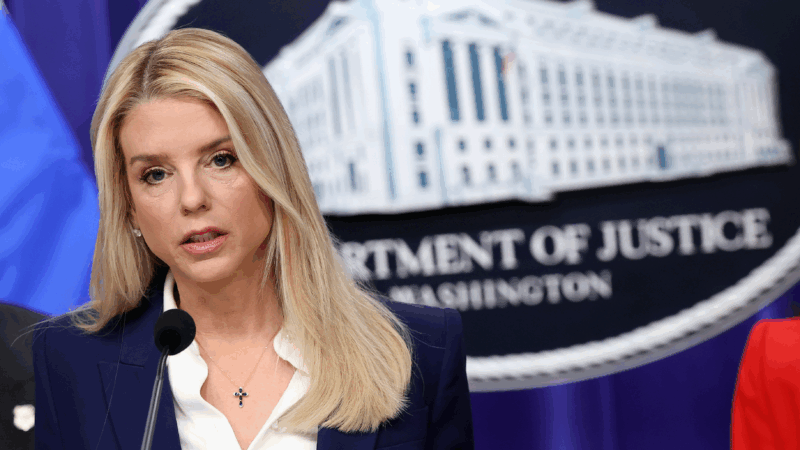The White House is sued over lack of sign language interpreters at press briefings
The National Association of the Deaf (NAD) has filed a federal lawsuit against the White House over a lack of American Sign Language interpreters at media briefings.
The NAD says the White House abruptly stopped providing ASL interpreters during press briefings and other public events when President Trump returned to office for a second term.
The lawsuit, filed on Wednesday, asks the court to require ASL interpreters be present at these events and that video of them be available for viewers.
ASL is distinct from English, with its own vocabulary and grammar. The NAD says “at least several hundred thousand” people in the U.S. communicate mainly in ASL, and many deaf and hard of hearing people know little English. That’s why the group says English closed captioning of briefings is not sufficient.
The lawsuit was filed in U.S. District Court for the District of Columbia and names President Trump, press secretary Karoline Leavitt and Chief of Staff Susie Wiles as defendants, along with offices for the president and vice president. The suit alleges the White House is violating Section 504 of the Rehabilitation Act of 1973, which is a cornerstone of federal disability rights law, as well as the First Amendment and Fifth Amendment.
“The White House’s failure to provide qualified ASL interpreters during public briefings, press conferences, and related events is against the law,” it reads. “Federal law unequivocally prohibits discrimination against individuals with disabilities and requires them to have meaningful access to the federal government’s programs and services. Failing to provide ASL interpreters deprives deaf people meaningful access to the White House’s press briefings.”
The White House did not immediately respond to NPR’s request for comment on the lawsuit.
Two deaf men are joining NAD in the suit. Derrick Ford, 36, lives in Anderson, Ind. The complaint says ASL is Ford’s primary language and that he’s concerned about “missing information about executive orders; diversity, equity, and inclusion (‘DEI’); Social Security; Medicare, the economy; and issues impacting Americans in general.” Ford has difficulty understanding English and closed captions.
The other man is Matthew Bonn, a 48-year-old resident of Germantown, Md., who attends Gallaudet University, a school in Washington, D.C., that uses ASL in the education of deaf and hard of hearing people. The lawsuit says Bonn also has trouble understanding closed captions and stopped watching White House press briefings in February because he couldn’t understand them. The complaint says “he wants information about the economy, Medicare and Medicaid changes, and executive orders on gender issues.”
The NAD says the White House ignored its repeated requests, including a letter sent to Wiles in January. According to the group, more than 48 million deaf or hard of hearing people live in the U.S.
“Deaf and hard of hearing Americans have the right to the same access to White House information as everyone else,” said Bobbie Beth Scoggins, Interim Chief Executive Officer of the NAD, in a statement. “Such information must be provided not only through captioning but also in American Sign Language.”
This isn’t the first time the group has sued the government over ASL. In 2020, the organization took the first Trump White House to federal court at the height of the COVID-19 pandemic. In that case, a federal judge ordered the White House to provide a qualified interpreter for all coronavirus briefings. After the order, the White House began providing ASL for pandemic-related briefings.
In 2021, under the Biden administration, the White House started including ASL interpreters for all press briefings and the following year hired the White House’s first full-time interpreters. The NAD says that at the time, interpreters were visible on all White House official communication channels.
In his first day back in office, Trump signed an executive order eliminating Diversity, Equity, Inclusion, and Accessibility (DEIA) programs and activities from the federal government.
Shootings at school and home in British Columbia, Canada, leave 10 dead
A shooting at a school in British Columbia left seven people dead, while two more were found dead at a nearby home, authorities said. A woman who police believe to be the shooter also was killed.
Trump’s EPA plans to end a key climate pollution regulation
The Environmental Protection Agency is eliminating a Clean Air Act finding from 2009 that is the basis for much of the federal government's actions to rein in climate change.
From gifting a hat to tossing them onto the rink, a history of hat tricks in sports
Hat tricks have a rich history in hockey, but it didn't start there. For NPR's Word of the Week, we trace the term's some 150-year-history and why it's particularly special on the hockey rink.
Pam Bondi to face questions from House lawmakers about her helm of the DOJ
The attorney general's appearance before the House Judiciary Committee comes one year into her tenure, a period marked by a striking departure from traditions and norms at the Justice Department.
The U.S. claims China is conducting secret nuclear tests. Here’s what that means
The allegations were leveled by U.S. officials late last week. Arms control experts worry that norms against nuclear testing are unraveling.
Ukrainian sled racer says he will wear helmet honoring slain soldiers despite Olympic ban
Vladyslav Heraskevych, a skeleton sled racer, says he will wear a helmet showing images of Ukrainian athletes killed defending his country against Russia's full-scale invasion. International Olympic Committee officials say the move would violate rules designed to keep politics out of the Olympics.







